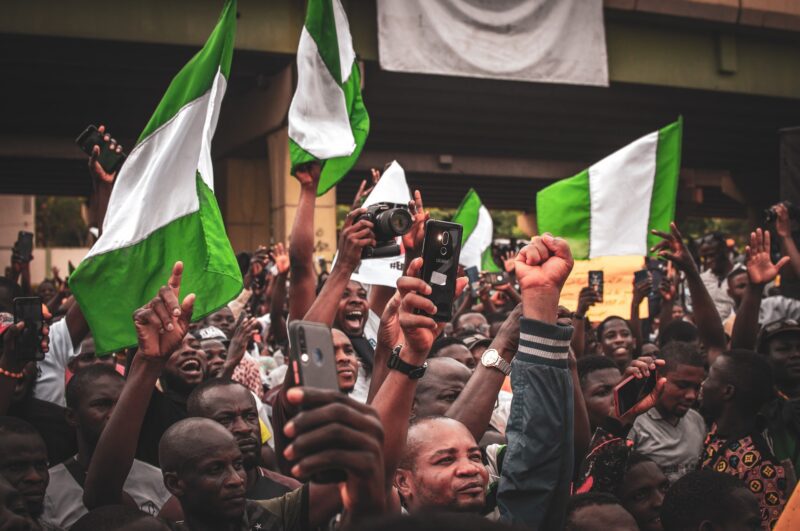By Arwen Kidd and Jeanne Bourgault
If the battle against disinformation is the defining challenge of our time, Nigeria is one of its most consequential – and overlooked – fronts.
In the lead up to tomorrow’s general elections, false rumors about the candidates and the electoral process have multiplied online. From doctored photos of underdog contender Peter Obi, to the manipulation of videos of incumbent President Muhammadu Buhari, and the proliferation of allegations against leading candidates, an ocean of disinformation divides Nigerian citizens from the polling stations.
How Nigerians, their media, and their institutions navigate these troubled waters will determine the future of their country – and far beyond.
It goes without saying that what happens in Nigeria does not, in fact, stay in Nigeria. The solidity of Nigeria’s democracy is of extreme import not just for West Africa, but globally. Nigeria is the most populous country in Africa, the largest economy on the continent, a fossil fuel giant, and a cultural superpower. As autocracies grow stronger around the world, and coups d’etat re-emerge in Africa – with recent successful military takeovers in Chad, Mali, and Burkina Faso – free and fair elections in Nigeria could inspire dozens of other emerging democracies around the world to halt a worrying trend towards authoritarianism. But the infodemic of fake news stands in the way.
In Nigeria, the problem of mis- and disinformation is manifesting in ways that, to a Western audience, are both familiar and foreign. Widespread mistrust in institutions and a heavy reliance on personal networks make it so that citizens are much more inclined to believe what they hear from their neighbors than their government. As a result, rumors that emerge “organically” from small communities can become massive stories in an unstoppable, social media-powered telephone game that spreads across the entire country.
The problem is compounded by a familiar lack of media literacy among large swaths of the population: the relatively recent surge of Internet penetration in Nigeria has not been paired with enough public initiatives to help citizens discern factual information published by reputable sources from harmful rumors. According to We Are Social’s Digital 2022 Report, the issue of mis- and disinformation in Nigeria has become so widespread that as many as 72.1% of online adults in the country express concern about what is real versus what is fake on the Internet.
Print and broadcast media are under threat, too. As elsewhere in the world, traditional business models that relied on circulation and ad revenue have been jeopardized by the rise of digital platforms, starving news outlets of financial resources. Local journalists are also under frequent threats to their personal safety. This difficult situation makes the profession less attractive, less remunerated, and more subject to corruption.
Lastly, in addition to manipulating the public’s voting preferences, mis- and disinformation are likely to negatively impact voter turnout. False claims of imminent attacks on polling stations, especially in the most insecure North-Eastern regions, could push many citizens to stay home on election day.
In this difficult scenario, it is understandable to feel a certain level of hopelessness – the same dread that many American or Brazilian citizens felt weeks before the storming of their palaces of power. But while there are no easy, short-term fixes, much can be done in the medium and long-term to support the stability of democratic institutions and a thriving independent media sector in Nigeria.
First, media literacy initiatives around the post-electoral period should be implemented. The more the citizenry possesses factual, unbiased information about their rights, the voting proceedings, and the transition between administrations, the harder it will be to spread mistrust in the process and stir up violence. This should be done in partnership with individuals that enjoy people’s trust: local teachers, religious leaders, footballers, Nollywood stars – people who are perceived as outside of politics, with the best interest of the community at heart. The messenger matters.
Secondly, traditional media outlets should focus on minimizing hate speech and incendiary content. Fact-checking organizations like Dubawa, FactCheckHub, AfricaCheck, and dozens of others already play a key role in holding malicious actors accountable and preventing mis- and disinformation from spreading. Newspapers and TV stations should follow suit. While there is a monetary incentive in publishing inflammatory articles that people want to read, media outlets have a stronger incentive to prevent violence – not only against parts of the population but also against their own staff – by publishing responsible content.
Finally, there should be long-term plans to ensure the sustainability of ethical journalism in Nigeria. Most local and international development organizations are working hard to improve the quality of journalism with trainings and fellowship programs. But while these activities are incredibly important, they are not sufficient. Currently, there is a lack of focus on the sustainability of local media business models. As long as news outlets in Nigeria struggle to keep the lights on, ethical journalism will always be under threat. More development organizations should focus on training local media actors in fundraising, business management, and advertising.
On the brink of one of the most pivotal elections of this year, disinformation threatens decades of democratic progress in Nigeria. Let this vote, and its aftermath, prove to the world that the battle against disinformation is getting easier to win.
Jeanne Bourgault is the President and CEO of Internews.
Arwen Kidd is Internews’ Project Director in Sierra Leone.
